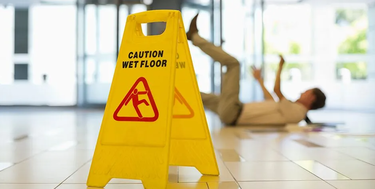
If you legally set foot on someone’s property as a licensee or guest, you are owed safe premises. Should you slip, fall, and injure yourself on a residential or commercial property in Washington state, it is your right to take legal action. Determining who to hold liable depends on the nature of the accident. To help you determine who is at fault for your injuries, review the following guide.
For a person or entity to be liable in a slip and fall case, the plaintiff’s attorney must show that they were owed a duty of care. Such care refers to the victim stepping onto the property legally and therefore was not trespassing. Anyone who is not on a property lawfully and sustains injuries is not owed duty of care and cannot claim damages.
If the property owner breached their duty of care, it means there was at least one hazard on the premises that directly resulted in the plaintiff’s injuries. The plaintiff suffered damages and is subsequently owed compensation.
Since Washington is a contributory fault state as per RCW 4.22.005, it is possible for plaintiffs to collect damages no matter how much they are to blame for their injuries. For example, if the plaintiff ignored “Wet Floor” signs in a grocery store and sustained injuries from falling down, they might be found 70% to blame for the incident. If they requested $20,000 in damages, they receive $6,000. The blame percentage determines compensation. Other states follow modified comparative negligence laws, meaning a plaintiff who is 51% or more to blame for their injuries cannot collect damages.
The property owner is generally liable in a residential slip and fall case in Washington. For example, say motor oil or gasoline spilled onto a walkway at the property owner’s home. An HVAC technician entered the property to inspect the furnace, but the owner did nothing about the spill. “Doing something” can include cleaning the spill, alerting the technician to the spill and providing an alternate route, or erecting signage alerting the service professional to the spill. Because none of these things happened, the property owner breached duty of care and is therefore liable.
If the residential slip and fall accident occurred at a rental property, the tenant is usually not liable. For example, say the stairs and walkway to a home were covered in ice after a recent storm. It is the landlord’s job to keep the walkway and stairs ice-free, yet this individual did not take the appropriate measures when they said they would, such as by 1pm that day. As a result, the ice was not melted, nor were any signs or alternate routes provided. Friends of the tenant arrived at the house for a small gathering, only to slip, fall, and seriously injure themselves. Because the landlord did not melt the ice or take other measures when they were supposed to, the owner is liable and will likely pay significant damages.
When a slip and fall accident occurs on a commercial property, such as a retail or grocery store, it is usually because of wet flooring from assorted spills. However, debris in the aisles and wrinkled store rugs can also cause these accidents. Commercial slip and fall case liability typically falls on the property owner. If the owner is usually on the premises and oversees daily tasks, it is their responsibility to maintain safe premises. Should they fail in this regard, they have breached duty of care and therefore owe compensation to those who sustain injuries.
However, there are times when someone other than the property owner is liable for unsafe commercial premises. For example, if the owner is rarely present and the manager is responsible for overseeing the store, they are liable for slip and fall accidents. It is the manager’s job to keep the premises safe for customers, which they failed to do. Other times, the lessor, or individual leasing the commercial property, is responsible for any accidents that occur on the premises. In such a case, the property owner might not even live in the state and is therefore not liable for what goes on in their building. The lessor is subsequently entirely responsible for maintaining safety and failing to maintain OSHA standards, resulting in liability.
Personal injury lawyers help plaintiffs in slip and fall accidents determine if they have viable cases and advise them regarding what damages to request. Economic damages in these types of personal injury cases can include:
Non-economic damages, or those relating to psychological and emotional stress from the accident, can include:
If the injury victim died from their injuries, it is possible for their surviving loved ones to file a wrongful death suit and claim damages.
If you were recently involved in a slip and fall incident, contact a lawyer to learn what your options are.
